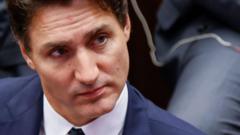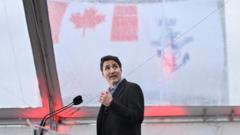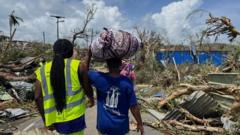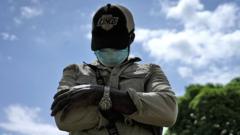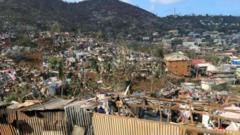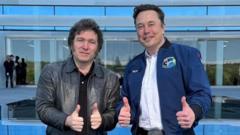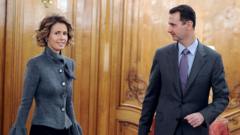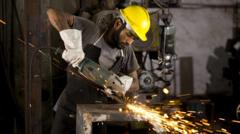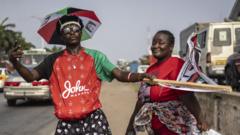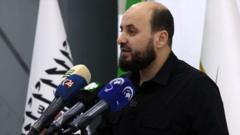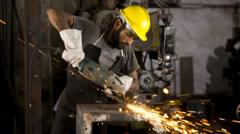Nathaniel Qainoo, a mechanic in Ghana, embodies the frustration of many young citizens confronting severe economic challenges ahead of national elections. Both leading candidates, former President Mahama and Vice President Bawumia, offer contrasting plans for recovery, but skepticism remains regarding their feasibility as Ghana navigates turmoil.
Ghana's Electorate Faces Economic Hardship as Candidates Clash for Presidency
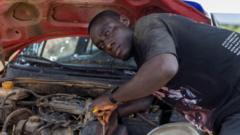
Ghana's Electorate Faces Economic Hardship as Candidates Clash for Presidency
Amidst an economic crisis, young Ghanaians express disillusionment with political leadership while major candidates promise economic reforms in the upcoming elections.
Ghanaian Nathaniel Qainoo, a 29-year-old mechanic and former accountant, exemplifies the struggles faced by many as the nation braces for presidential and parliamentary elections on Saturday. With soaring inflation and a weakened currency, Qainoo finds himself under a mango tree, repairing a taxi rather than pursuing a career in accounting, a field he studied for five years without securing employment. His sentiment is echoed by many in Ghana, where "the hardship" has taken on a life of its own since the economic crisis erupted in 2022, leading to a default on national debts and downgrading of credit ratings.
Qainoo's disillusionment is noteworthy; he has opted not to vote due to a lack of faith in the political system's ability to engender change. He dreams of emigrating to North America or Europe as he contemplates the grim job market in the country, where youth unemployment stands at a staggering 14%. His experience resonates with many younger Ghanaians, approximately 40% of the population, who hold similar aspirations for better opportunities abroad.
The economic landscape is a focal point in the campaigns of two main candidates aspiring to succeed the outgoing President Nana Akufo-Addo. John Mahama, the former president, hopes to reclaim power after an eight-year hiatus, while Vice President Mahamudu Bawumia aims to embrace the presidency after serving in his current role. As both candidates highlight the role of the economy, their promises diverge, with Mahama vowing to "reset" the economy and Bawumia focusing on creating a "digital economy."
Bawumia's proposal includes developing infrastructure for technology and skills training for one million youth, while Mahama seeks to establish a "24-hour economy" to increase job availability. However, skepticism lingers over the implementation of these plans amidst the IMF-backed recovery program. Political analysts indicate that both candidates will face pressure to manage fiscal challenges while appealing to voters eager for tangible solutions.
Despite the differing platforms, the political battle is regarded as close, with opinion polling suggesting Mahama leads slightly ahead of Bawumia. However, disparities in polling results have led to debates about their accuracy, leaving the possibility of a run-off very much in the air as the young electorate holds the key to the future direction of Ghana’s governance. As Qainoo reflects on his situation, the outcomes of this election will significantly impact not only his life but the broader economic landscape for generations to come.
Qainoo's disillusionment is noteworthy; he has opted not to vote due to a lack of faith in the political system's ability to engender change. He dreams of emigrating to North America or Europe as he contemplates the grim job market in the country, where youth unemployment stands at a staggering 14%. His experience resonates with many younger Ghanaians, approximately 40% of the population, who hold similar aspirations for better opportunities abroad.
The economic landscape is a focal point in the campaigns of two main candidates aspiring to succeed the outgoing President Nana Akufo-Addo. John Mahama, the former president, hopes to reclaim power after an eight-year hiatus, while Vice President Mahamudu Bawumia aims to embrace the presidency after serving in his current role. As both candidates highlight the role of the economy, their promises diverge, with Mahama vowing to "reset" the economy and Bawumia focusing on creating a "digital economy."
Bawumia's proposal includes developing infrastructure for technology and skills training for one million youth, while Mahama seeks to establish a "24-hour economy" to increase job availability. However, skepticism lingers over the implementation of these plans amidst the IMF-backed recovery program. Political analysts indicate that both candidates will face pressure to manage fiscal challenges while appealing to voters eager for tangible solutions.
Despite the differing platforms, the political battle is regarded as close, with opinion polling suggesting Mahama leads slightly ahead of Bawumia. However, disparities in polling results have led to debates about their accuracy, leaving the possibility of a run-off very much in the air as the young electorate holds the key to the future direction of Ghana’s governance. As Qainoo reflects on his situation, the outcomes of this election will significantly impact not only his life but the broader economic landscape for generations to come.

